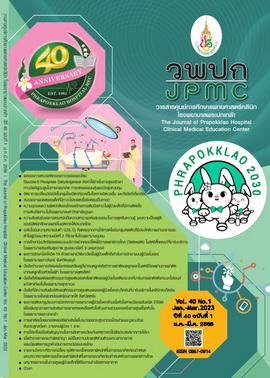Factors Affecting Postoperative Self-care Behavior of Cataract Patients Undergoing Cataract Surgery with an Intraocular Lens in Suthavej Hospital
Main Article Content
Abstract
BACKGROUND: Cataract is a disease that affects the elderly. Most of the reasons are due to deterioration. If treatment is delayed, received improper treatment, or acting improperly after cataract surgery may result in the patient being blind.
OBJECTIVE: To study the factors affecting postoperative self-care behavior of cataract patients undergoing surgery with an intraocular lens in Suthavej Hospital.
METHODS: This was exploratory research. The samples used in the study were cataract patients undergoing cataract surgery at Suthavej Hospital and attending follow-up appointments after surgery at the Ophthalmology Department of Suthavej Hospital. From March to May 2022, 150 people were selected by selective selection. The statistical values used in the analysis were percentage, mean, standard deviation, chi-square, Pearson's correlation coefficient, and multiple regression analysis.
RESULTS: The sample group's self-care behaviors were at a good level. Biosocial factors did not correlate with self-care behaviors. As for internal factors, there was a positive correlation with self-care behaviors. Statistically significant at 0.01 level. The positive correlation with self-care behavior of patients after surgery was statistically significant, namely knowledge of disease and cataract surgery. Health beliefs about the illness and surgery self-efficacy in self-care and social support When considering independent variables that had the best power to predict the change in self-care behavior after surgery was self-efficacy in self-care, followed by social support and health beliefs about disease and surgery, respectively.
CONCLUSIONS: Knowledge of disease and surgery and social support. There was a positive correlation with postoperative self-care behavior of cataract patients undergoing surgery with intraocular lens implants. Therefore, the multidisciplinary team should work together proactively to organize a health education program on how to behave after surgery while returning home. By allowing patients and relatives to participate in listening to the teaching as well as enabling them to ask questions so that relatives can share knowledge to help support patients to take care of themselves after cataract surgery when they can return to their homes. Thus, the patients will not have complications after surgery due to improper self-care behavior.
Article Details

This work is licensed under a Creative Commons Attribution-NonCommercial-NoDerivatives 4.0 International License.
References
Patikulsila D. Cataract. In: Ausayakhun S, editors. Common eye diseases in medical practice. 3rd ed. Chiang Mai: Department of Ophthalmology, Faculty of Medicine, Chiang Mai University; 2017. p 81-93.
Campbell RJ, Ten Hove MW, El-Defrawy SR, Hooper PL. Cataract surgery quality and capacity. Healthc Q 2019;22:6-10.
Kasetsuwan N. Disease of the lens. In: Tantisevi V, editors. Ophthalmology. Bangkok: Department of Ophthalmology, Faculty of Medicine, Chulalongkorn University; 2018. p 197-230.
Simaroj P, Poonyathalang A. Cataract. In: Lekskul A, editors. Ramathibodi Ophthalmology Bangkok: Department of Ophthalmology, Faculty of Medicine Ramathibodi Hospital, Mahidol University; 2018.
Ophthalmology Department. Annual report of Cataract case, Suthavej Hospital. Mahasarakham: Faculty of Medicine, Mahasarakham University; 2021.
Peterson SR, Silva PA, Murtha TJ, Sun JK. Cataract surgery in patients with diabetes: management strategies. Semin Ophthalmol 2018;33:75-82.
Kato K, Miyake K, Hirano K, Kondo M. Management of postoperative inflammation and dry eye after cataract surgery. Cornea 2019;38 Suppl 1:S25-S33.
Choosri P. Factors influencing the effectiveness of cataract surgical services in hospitals under the jurisdiction of the Ministry of Public Health [Dissertion]. Bangkok: Mahidol University; 1997.
Monthonpanyakul C. The relationship between health beliefs and self - care behavior in blindness prevention of cataract patient at Mettapracharak (Wat Rai Khing) hospital[Dissertion]. Bangkok: Srinakharinwirot University; 1999.
Pongpanich T. Self - care of glaucoma patients in glaucoma clinic at Rajavithi hospital [Dissertion]. Bangkok: Srinakharinwirot University; 2000.
Green LW, Kreuter MW, Deeds SG, Partridge KB. Health education planning: a diagnostic approach. California: Mayfield Publishing; 1979.
Vongfun P. Quality of elderly life: applying PRECEDE framework theory [Dissertion]. Chiang Mai: Chiang Mai Rajabhat University; 2017.
Puangpech B, Asdornwised U, Pinyopasakul W, Pornpanich K. The effectiveness of a same day surgery discharge planning program on anxiety and activities of daily living in patients undergoing cataract surgery. Nurs Sci J Thai 2016; 34 Suppl 1: 53-62

